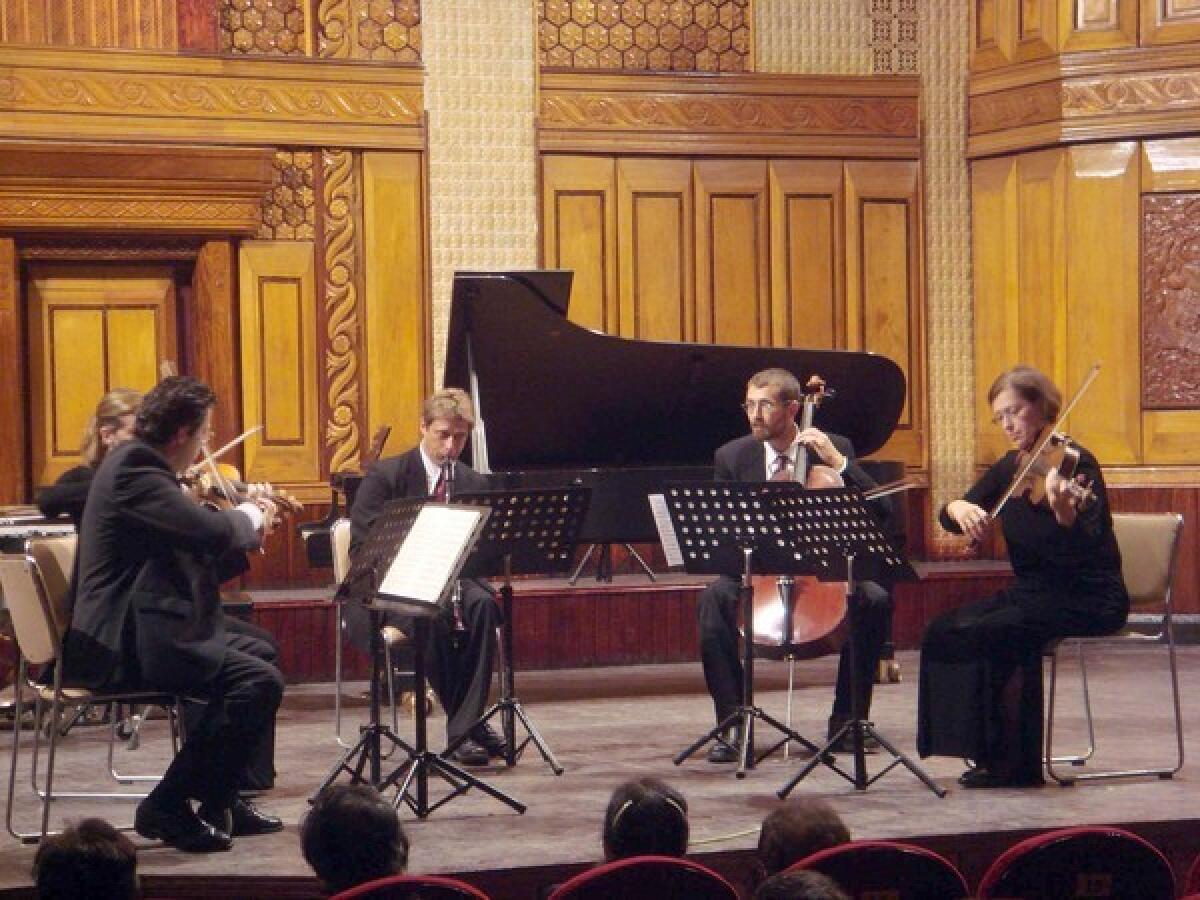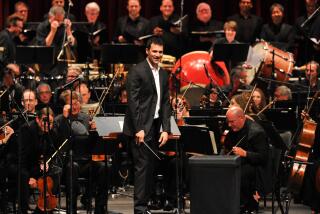American musicians bond with Vietnamese counterparts

When Southwest Chamber Music became the first American ensemble since the Vietnam War to set up a musical residency in Vietnam in 2006, artistic director Jeff von der Schmidt had high hopes that the two countries -- forever tied through history and war -- would forge lasting bonds in music.
Now the Pasadena-based group is cementing its position to help guide Vietnam’s musical future. With a highly competitive grant from the U.S. State Department, Southwest will soon embark on a six-week exchange with Vietnam’s two premier music institutions.
Concerts in both countries will feature works from up-and-coming Vietnamese and American composers as well as pieces from the older generation of composers.
The partnership with Southwest will have a big impact on Vietnam’s music scene, said Tran Thu Ha, former director of the Vietnam National Academy of Music in Hanoi, one of the participating institutions. “This project is rather unique in that the two groups, Vietnamese and American, do not just share the stage . . . they play each other’s music together,” said Tran in an e-mail from Vietnam. The partnership allows both ensembles to “really interpret the soul of another country’s music.”
Vietnam has a strong foundation in classical music, which was established by the French, who brought the repertoire to Vietnam during its colonization period. Southwest’s partnership will focus on contemporary classical music, which is newer to Vietnamese ears.
The Ascending Dragon Music Festival kicks off with a Feb. 27 performance at the Armory Center featuring works by four American and Vietnamese “composers-in-residence.” It’s followed by a March 1 performance with pieces by Olivier Messiaen and Vietnamese-French composers Nguyen Thien Dao and Ton That Tiet, whom Von der Schmid calls the “founding fathers of contemporary classical music in Vietnam.”
The ensemble will then travel to Vietnam and perform alongside Vietnamese musicians, including one concert in the nearly century-old Hanoi Opera House, which seats 600. In April, the ensemble will return to Southern California with a group of Vietnamese and perform five concerts.
The partnership between Southwest and Vietnam is part of a broader push for increasing cultural exchange between the U.S. and Vietnam, whose ties have deepened economically, diplomatically and now culturally since the countries normalized relations in 1995. In recent years, Vietnam has sought more exposure from the world stage. The New York Philharmonic traveled there for the first time in October.
The historical ties among Vietnam, the U.S. and France are particularly interesting when filtered through music, Von der Schmidt said. “There is a potential for a change in attitudes,” he said. “The State Department isn’t going to send us to Paris or Tokyo to do this type of an exchange. The excitement for me in Vietnam is that there is an opportunity in the 21st century to assess the results of the colonial era with the French and the huge collision with the U.S.”
He pointed to a program in Hanoi that begins with Messiaen’s “Quartuor pour la fin du temps,” written in a concentration camp during World War II. It’s followed by a piece by Ton That Tiet, a Vietnamese exile who composed “Les jardins d’autre monde” to evoke the imperial tombs of Hue while living in Paris. The evening ends with “Atlas Eclipticalis” by John Cage, an American who found inspiration from Zen Buddhism.
The partnership came about after Southwest traveled to Hanoi in 2006 and held a series of concerts and master classes. The ensemble began to explore a much broader relationship with Vietnam with the help of its communications director, Thu-Nga Dan, a professionally trained pianist who happened to be the daughter of Tran, from the Vietnam National Academy.
Dan, who calls the academy her “second home,” said the partnership with Southwest will foster a better environment for classical music to attract Vietnamese audiences. Most performances in the Communist-ruled country rely on government funding or foreign sponsorship, and Vietnamese musicians have struggled to find ways to get corporations to fund classical music promotion, Dan said. “They look at Southwest Chamber’s model and they say, ‘How do you do that?’ ” Dan said.
Southwest will be passing along “best American practices” to its Vietnamese counterparts, including marketing, fundraising and corporate philanthropy, Von der Schmidt said.
Nineteen Vietnamese participants will visit Southern California’s arts institutions, including the Colburn School, the Los Angeles Philharmonic and the California Institute of the Arts. They will attend a panel with local corporate philanthropic community leaders and will brainstorm ways that the Vietnamese musicians can adopt similar funding mechanisms.
Southwest is also hoping to lay the foundation for the burgeoning contemporary classical music scene in Vietnam.
“Honestly, I am very excited about this, but I am also very concerned . . . to see how they will react to this new music,” Dan said. “In Vietnam, it’s mostly the classical repertoire, mostly Bach, Chopin.”
Contemporary classical music, which sometimes breaks harmonic conventions and uses unique instrument ensembles, can be unexpected for Vietnamese audiences, Dan said.
Such is the case of the music of Vu Nhat Tan, one of the Vietnamese composers premiering pieces in the exchange. One of Vu’s commissioned works -- “Pho” (Cityscape) -- evokes the cacophony of Vietnam’s major cities, balanced with the soulful sound of the dan bau, a Vietnamese monochord.
Tran said that when Vietnamese musicians first looked at the scores Southwest sent, some expressed apprehension. “They were asking themselves, ‘What is it?’ “How am I supposed to interpret or play that?’ ” she said.
But the musicians began to make sense of the music and are enthusiastic about the challenge, she said. Contemporary classical music “is so new, but if we don’t do it, they will never be exposed to it,” Dan said. “Southwest will give the opportunity for younger composers to have a voice.”
Jan Karlin, Southwest’s executive director, said several Vietnamese arts administrators felt their students had not been exposed to enough American or contemporary music worldwide. The performances in Vietnam will include a range of contemporary pieces, including the U.S. and Asian premiere of Elliott Carter’s “On Conversing With Paradise.”
“Unless they received that exposure,” Karlin said, “they would not be able to compete well on the world stage.”
Karlin recalled a meeting with Vietnamese musicians at the Hanoi academy in March. On the walls of the room, she said, were the “usual photos” of composers: Bach, Beethoven, Mozart, Ravel.
Karlin told the group: “Our goal is to have Vietnamese pictures of composers on that wall.”
“Vietnam has to own its own culture in classical music,” Karlin said. “The contemporary music will, we hope, help them take pride in what came before.”
More to Read
The biggest entertainment stories
Get our big stories about Hollywood, film, television, music, arts, culture and more right in your inbox as soon as they publish.
You may occasionally receive promotional content from the Los Angeles Times.






